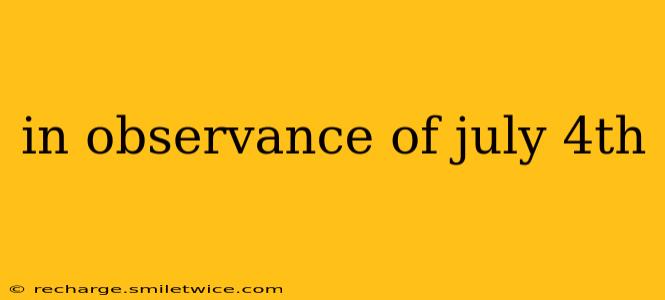July 4th, Independence Day, is more than just a long weekend and fireworks; it's a commemoration of a pivotal moment in American history – the adoption of the Declaration of Independence in 1776. This declaration boldly proclaimed the thirteen American colonies' separation from British rule, igniting a revolution that shaped the course of the nation and continues to resonate globally. This article delves into the significance of this day, exploring its historical context, traditional celebrations, and its enduring relevance today.
What is the significance of July 4th?
The significance of July 4th lies in its representation of freedom, self-governance, and the pursuit of liberty. The Declaration of Independence, a powerful statement of ideals, asserted the inherent rights of all individuals – life, liberty, and the pursuit of happiness – principles that continue to inspire democratic movements worldwide. It marked a decisive break from oppressive rule and laid the groundwork for the establishment of a new nation founded on the principles of equality and self-determination. It wasn't just a declaration; it was a commitment to a future built on these foundational values.
What are some traditional ways to celebrate July 4th?
Celebrations of Independence Day are vibrant and diverse, reflecting the nation's rich tapestry of cultures and traditions. Many communities organize parades featuring patriotic floats, marching bands, and community groups. These parades are a joyful expression of national pride and community spirit. Barbecues and picnics are quintessential July 4th events, bringing families and friends together for good food and fellowship. Fireworks displays, often synchronized to patriotic music, are a spectacular culmination of the day's celebrations, illuminating the night sky with bursts of color and light. Many also participate in community events, historical reenactments, or attend concerts featuring patriotic themes.
What are some of the historical events leading up to July 4th?
The events leading up to July 4th were a culmination of years of growing tension between Great Britain and its thirteen American colonies. Taxation without representation, oppressive policies, and the denial of basic rights fueled colonial resentment. Events like the Boston Tea Party, the Battles of Lexington and Concord, and the formation of the Continental Army all served as crucial stepping stones towards the inevitable declaration of independence. These events demonstrated the colonists’ unwavering resolve to fight for their freedom and establish a nation based on their own principles. The road to independence was paved with struggle, sacrifice, and the unwavering belief in the ideals of liberty and self-governance.
How is July 4th celebrated around the world?
While the United States is the primary location for July 4th celebrations, the holiday's significance resonates globally. Many countries with close ties to the United States, or those inspired by its democratic ideals, acknowledge the holiday in various ways. American embassies and consulates often host events, and individuals of American descent living abroad often organize gatherings and celebrations. The holiday serves as a reminder of the ongoing pursuit of liberty and self-determination worldwide. It highlights the enduring impact of the American Revolution on global movements for freedom and democracy.
Why is celebrating July 4th important?
Celebrating July 4th is important because it allows us to reflect on the sacrifices made by those who fought for independence and to reaffirm our commitment to the ideals enshrined in the Declaration of Independence. It’s a time to appreciate the freedoms we enjoy and to consider how we can contribute to upholding the principles of liberty, equality, and justice for all. Remembering the past empowers us to build a better future, ensuring that the sacrifices made are never forgotten. The holiday's importance extends beyond mere patriotism; it's a call to action to safeguard and uphold the democratic values upon which the nation was founded.
What are some less traditional ways to celebrate July 4th?
Beyond the usual parades and fireworks, there are many less traditional ways to celebrate July 4th that offer a unique perspective on the holiday. Volunteering at a community organization, attending a historical reenactment, or visiting a historical site related to the American Revolution are all ways to engage with the historical context of the holiday. Learning more about the Declaration of Independence or the lives of the Founding Fathers provides a deeper understanding of the day's significance. These alternative methods encourage reflection and a more meaningful engagement with the day's significance beyond simple entertainment.
In conclusion, July 4th is a day of national pride, reflection, and celebration. It's a time to remember the sacrifices that led to American independence and to reaffirm our commitment to the ideals of liberty and self-governance. The enduring relevance of this day serves as a reminder of the importance of protecting and preserving these values for generations to come.
